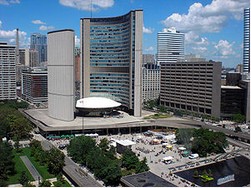Toronto Public Library Ignores City Guideline !
Although the City’s guideline for the 2010 Operating Budget requires a 5% reduction from the 2009 Approved Budget, the 2010 recommended budget increase for TPL is 1.8%.
In January 18th, 2010, the Toronto Library Board did not endorse all of the recommended reduction options totaling $2.423 million. The 2010 Approved Capital Budget and Capital Plan for the years 2011 and 2012 will result in a cumulative increase in TPL’s Operating Budget of $1.419.
What is the point of having a city guideline? The economy has yet to recover and with so many unemployed. How could Toronto Public Library justify this increase in expenditure? What is more important to you, emergency services that cover the city well, long-term care homes, street repairs or this?
2009-2018 recommended capital plan and forecast for City is -$4.410 Billion, 25% Financed by Debt.
Related articles by Zemanta
Community Center or a Library ?
- Image via Wikipedia
Last year Toronto City Council approved a 5 Yr Capital plan of $11 billion. This includes capital projects the City will undertake to develop and maintain City assets like transit, road, bridges, community centers and libraries.
Interesting enough last year our public Toronto Public Library also received $3M boost from Federal government for renovations which they are currently using to renovate and super size libraries across the city. You may have noticed these new libraries have started to offer programs that are usually offered by a community center, like youth programs, community meetings etc. This blurs the line between a community center and a library and it leaves one to wonder why we are paying for the same programs twice.
Related articles by Zemanta
Canada’s National Debt Hits $500 Billion
Over the next 5 years Canadian federal government will be adding another $170 billion to the deficit so the share of this debt for each of us will be $15,000. We are living in uncertain times and faced with budget shortfalls in many areas we should be questioning every dollar spend by our government.
For instance, the Children Aid Society (CAS) is calling on provincial government to reverse funding cuts. CAS is faced with $1.1 million shortfall. This is a society that delivers child-protection services on behalf of Government of Ontario to vulnerable children and families. They are forced to go to debt to pay for investigations, residential care, support and counseling for children. With tough times and increase unemployment the agency has observed a 14% increase in number of cases. The government has made a choice to put vulnerable childern at risk during a recession whilst boosting Toronto Public Library, TPL budget by $3 Million dollars so they can rebuild their buildings across Toronto !
Ontario’s New 13% Harmonized Sales Tax – What It Will Mean To You
Next summer (2010) the Ontario Government is set to put into force its new harmonized GST/PST sales tax which will apply a 13% sales tax to everything we purchase.
Things That Were Not Subject To The Current 8% PST Will Be Now Taxed As a result, things that were not previously taxed under the current Ontario Provincial Sales Tax (PST) will be taxed at 8%.
The new 13% tax will therefore apply to things like your electric bill, your gas bill, your water bill, condominium fees, insurance premiums, and every other good and service you purchase. There are almost no exemptions. Read the rest of this entry »
Circular Intersection vs. Stop Signs and Traffic Lights

Did you know circular intersections can significantly improve the efficiency of traffic flow, reduce vehicle emissions and ultimately fuel consumption. In Virginia, study has shown it has reduce carbon monoxide and nitrous oxide emission by over 30%.
You might be skeptical at first but when you start using them you will be impressed. The amount of time we waste idling at traffic lights or waiting in line ups at stop signs mounts each year.
Why not apply this tried and tested solution in Toronto. It is effectively in use in big cities like London, Paris, Amsterdam, Tokoyo, Moscow etc.
In United States they have build over 1000 roundabouts. There are about 15,000 in Australia and 10,000 in the United Kingdom. The are currently active programs to build more roundabouts in California, New York, Michigan, North Carlonia and numerous other states.
We need circular intersections in busy traffic locations instead of a cosmetic ones that are build in remote locations. It is also safer for pedestrian and cyclists…
Be a Proud Torontonian
Toronto has the third largest English theater center in the world, behind New York and London.
Toronto’s public transit system is second largest in North America.
25% of all Hollywood filming is done here in Toronto, making Toronto third largest movie and TV production center in North America.
Caribana parade is the largest Caribbean festival in North America.
Toronto has largest underground pedestrian system in North America, PATH.
Toronto has one of the largest towers in world, CN Tower, 1,815 ft high.
Toronto is the 5th largest city in North America, after Mexico City, New York, Los Angles and Chicago
Hollywood stars, Jim Carrey, Mike Myers and Eugene Levy are all from GTA
We will be hosting 2015 Panam games.
Toronto Avenues
The Avenues are Toronto’s main commercial streets and are identified by City Planning Division as one of four areas that can best accommodate growth.
Re-urbanization of the Avenues is anticipated and encouraged to accommodate new housing and job opportunities, while improving streetscapes, shopping, and public transportation – all in a form that is compatible with adjacent land uses, including Neighbourhoods.
Here are some well known avenues that will be impacted:
- Steeles Avenue
- Finch Avenue
- Lawrence Avenue
- St. Clair Avenue
- Victoria Park Avenue
- Eglinton Avenue
It is important to note however, that not all lands which fall within the Avenues are designated for growth.
The ‘Avenues and Mid-Rise Buildings Study’ currently being prepared by Brook McIlroy Planning + Urban Design/Pace Architects together with Quadrangle Architects is ongoing and is expected to be finalized by the end of 2009. The study will cover:
- An analysis of mid-rise building precedents, typologies and test sites
- A proposed categorization of the Avenues
- An analysis of lot depths on the Avenues
2009-2012 Toronto Bike Plan and Cycling impact in City of Toronto

- Image via Wikipedia
Toronto Bike Plan to be completed by 2012. The plan is to have 1,000 km bike way Network, consisting of three bikeway types: Bicycle lanes; shared roadway routes; and off-road paths.
The Bike network is currently 395 km and it is managed by Transportation Services with a 5 Year Capital Plan of $69 M.












